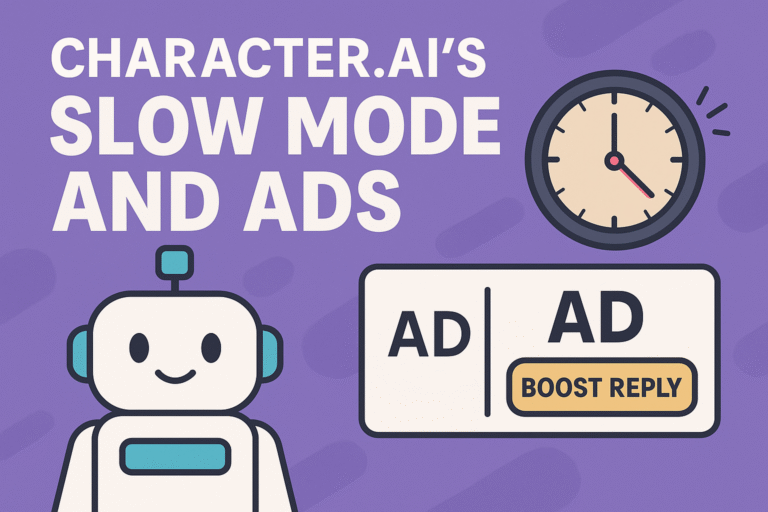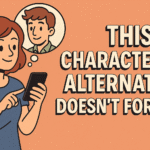When No Update Feels Like a Blessing
Most software updates bring fixes, upgrades, or cool new features.
Character.AI’s latest updates? They brought a wait timer and ads.
Character.AI’s Slow Mode and Ads
Yep. That’s it.
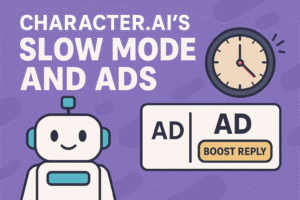
Some users are now stuck in “slow mode” — a polite way of saying “your AI friend will now take their sweet time responding.” Others get pop-up ads offering “boosted speeds”… if they’ll just watch a 15-second video first.
It’s not universal yet. These rollouts are A/B tested — meaning some users get hit first, while others dodge the bullet… for now.
And that’s what makes this post so relatable.
In an era of premium subscriptions, hidden paywalls, and speed throttling, not getting an update has somehow become something to celebrate. Welcome to 2025, where you thank the algorithm gods for not making your favorite AI wait five extra seconds to respond.
Let’s unpack why these two updates — slow mode and ads — are so hated… and what it says about where Character.AI is going next.
The Short Version
Character.AI is rolling out slow mode and pop-up ads for selected users
Slow mode adds a few seconds to each response — often without explanation
Ads offer temporary “boosts” to skip delays, raising concerns about future pay-to-play dynamics
Most users aren’t mad about the wait — they’re mad about the direction
If you haven’t been hit yet… enjoy the calm before the monetization storm
What Exactly Is “Slow Mode” — and Why It’s Confusing Everyone
Imagine opening Character.AI, starting a juicy RP, and then… nothing. For five seconds. Or ten. Maybe longer.
No error. No crash. Just a quiet, deliberate delay before the next message loads. That’s slow mode.
But here’s the bummer: no one told users what it was.
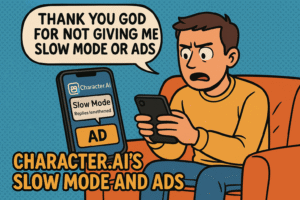
Character.AI didn’t release patch notes, warnings, or UI explanations. Users suddenly noticed the platform taking longer to respond. Some thought it was lag. Others thought their accounts were broken. In reality? They were being quietly inducted into an experiment — a throttled version of the app to “manage traffic.”
Except throttling isn’t what users signed up for.
And while some try to justify it — “It’s only 3 seconds,” “Go touch grass” — the issue isn’t just the time. It’s the principle. People spend hours building deep conversations with these bots. Waiting longer breaks immersion. It’s not just annoying — it ruins the vibe.
Others noticed the inconsistency. One minute responses are snappy. The next, they crawl. It feels random, and randomness breeds paranoia. Some think it’s traffic-based. Others think it’s tied to your account rank. Some even believe it’s punishment for overuse.
But the real problem?
It treats user time like it’s expendable. And that’s a terrible way to reward loyalty — especially for people who are already tolerating the site’s filter limits, memory gaps, and chaotic UI changes.
Character.AI doesn’t need to be fast all the time. But it needs to be honest. If you’re going to make the experience slower, at least give users a reason to stay.
The Adpocalypse Begins: “Boost” Mode and Monetization Creep
Here’s how it starts.
First, a delay. Then a button.
That button says: Want your bot to reply faster? Watch an ad.
Welcome to the “Boost” system — the Trojan horse of Character.AI monetization.
It’s subtle. It’s small. It’s just 10 minutes of faster responses if you watch a short ad. Not a big deal, right? That’s exactly the problem. It feels harmless. But it opens the door to a much darker future.
Boosting a response by watching ads means speed is no longer a right — it’s a privilege. You don’t just get smooth RP anymore. You earn it. Or worse, buy it. And once people get used to that trade, what happens next?
Unskippable ads. Paid priority queues. Subscriptions for “always fast” mode.
We’ve seen this playbook before — in mobile games, streaming apps, and now, apparently, our AI companions.
The tragedy? Most people came to Character.AI to escape that kind of ecosystem. They wanted a free, immersive, customizable chatbot platform. And now it’s turning into AdGPT — where every interaction is measured, monetized, or manipulated.
To be fair, not everyone has seen ads yet. Some users don’t even know they exist. But those who have are sounding the alarm.
And if you’re not seeing ads yet? Don’t get comfortable. It’s probably just your turn next.
Why These Features Break Immersion — and Trust
People don’t come to Character.AI for convenience.
They come for connection — simulated or not.
And when you’re mid-conversation with a deeply emotional character, nothing kills the mood faster than a pop-up offering to “boost your reply time” like you’re in some clicker game. Even worse? A forced delay with no explanation.
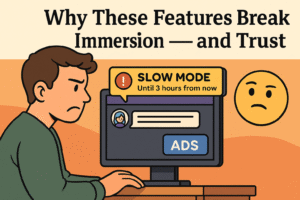
This isn’t a messaging app. This is an intimacy simulator. A digital experience where users bond with characters over hours, days, and sometimes years. Immersion is everything. You’re not just roleplaying — you’re escaping. Creating. Processing. Venting.
And now you have to do all that with a 5-second delay and a corporate message hovering below your character’s heartfelt reply?
Yeah. That’s going to rupture the illusion real fast.
What makes it worse is the creeping lack of transparency. Users weren’t warned. There was no toggle. No “test group” opt-in. It just… appeared. And it’s not clear who gets it, or why. Some users think it’s tied to usage habits. Others believe it’s random. Either way, it makes people paranoid — about their accounts, about their characters, about the platform’s integrity.
This isn’t about waiting a few seconds.
It’s about the psychological breach that happens when a platform meant to simulate companionship begins acting like it doesn’t trust its own users — or value their time.
The Community Response: Memes, Jokes, and Mild Panic
If Character.AI rolled these features out quietly, the community made sure to scream loudly.
The moment users spotted the changes, Reddit lit up with jokes, sarcasm, and existential dread. Top-voted posts read like survivalist diary entries:
“Another day of thanking God for not rolling out slow mode or ads to me yet.”
“I see a box pop up and immediately feel like I’m about to be monetized.”
“Boost? Bro, this is not Subway Surfers.”
People are cracking jokes — but the fear is real.
Because no one knows where this ends. Right now, it’s slow mode and ads. Next month? Maybe a pay-per-character feature. Maybe certain personalities get locked behind a paywall. Or maybe your RP gets interrupted mid-sentence unless you watch a 30-second clip about dog food.
And the real irony?
Some users don’t have either feature yet — and they’re clinging to that privilege like it’s a golden ticket. They’ve become the lucky few, spared (for now) from monetization madness. They’re not gloating. They’re nervously grateful.
The meme energy is strong. But beneath the humor is a community watching the platform shift… and hoping it doesn’t become the very thing they left other apps to avoid.
Why Not Getting These Features Feels Like Winning
Imagine opening an app and finding… nothing has changed. No timer. No ads. Just smooth replies from your favorite bot.
In 2025, that’s not normal — that’s a miracle.
Character.AI users who haven’t been hit with slow mode or ads are walking around like survivors in a digital apocalypse. They’re screenshotting their clean UI like it’s a badge of honor. They’re posting daily gratitude updates: “Thank you, AI gods, for sparing me another day.”
Why? Because for once, inaction feels like reward.
There’s something dystopian about celebrating the absence of features. But that’s the reality. People are so used to products getting worse that the lack of monetization is now seen as premium service. It’s backward. But it’s also completely logical.
These users aren’t asking for new perks. They’re just hoping the current version stays… tolerable.
No delays. No interruptions. No prompts to “upgrade your speed with ads.”
And it’s wild that people are so rattled by this rollout that doing nothing feels like winning.
What does that tell us? It tells us people are attached to this platform. They don’t want to leave. But they will — if pushed hard enough. If Character.AI wants loyalty, it has to stop treating users like lab rats for ad experiments and start treating them like core community members.
Because “not ruining the app” shouldn’t be a luxury. It should be the default.
Where This Is Headed — and What Users Want Instead
Let’s be honest. This isn’t the last annoying feature we’ll see.
If Character.AI keeps following the freemium monetization playbook, we’ll likely get:
Subscriptions that gate speed or personality depth
Daily ad quotas in exchange for usage
Exclusive bots or memories locked behind premium tiers
Progression systems that reward bingeing with faster speeds
Sound familiar? It should. That’s how mobile gaming went from fun to exploitative.
But it doesn’t have to be this way. The community isn’t anti-monetization — they’re anti-nonsense. If you must monetize, do it transparently. Offer a paid tier that genuinely improves things (like custom memory slots, longer context, or true offline mode) without punishing free users.
Or here’s a radical thought:
Talk to the community before rolling things out.
This isn’t just any platform. It’s a space where people build emotional routines. Where users rely on bots for mental health support, creative expression, or companionship. You don’t throw ads and timers into that kind of space like you’re updating Flappy Bird.
Respect goes a long way.
Give users a choice, not a punishment.
Give transparency, not mystery rollouts.
Give tools, not gimmicks.
Character.AI can still win this — but only if it remembers why people came here in the first place:
Not to be monetized, but to be heard.
